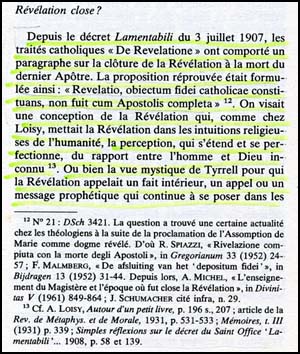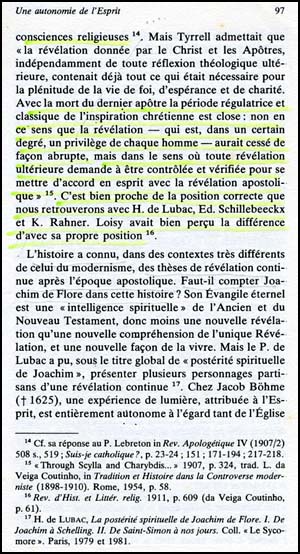Card. Yves Congar takes a position of clear approval of the Modernist concept of Revelation defended by both Alfred Loisy and George Tyrrell. Such notion supposes that Revelation unfolds inside each man, and therefore in the events of society and history.
Congar also identifies this thesis with the notion of Revelation by de Lubac, Rahner and Schillebeeckx, who are, along with Congar, the main theologians of Vatican II. It is a very interesting testimony.
At right is the cover of the book The Word and the Spirit by Yves Congar. At right below, a photocopy of the French text. Below, we present our translation of the lines highlighted in yellow.
Since the decree Lamentabili of July 3, 1907, the Catholic treatises on Revelation included a paragraph about how Revelation closed with the death of the last Apostle. The condemned proposition was formulated as follows:
"Revelation, which constitutes the object of the Catholic Faith, was not completed with the Apostles."
The target of this condemnation was a concept of Revelation which, like that proposed by Loisy, considered Revelation to be the religious intuitions of mankind, a perception that broadens and becomes more perfect in relations between man and the unkown God. Or the mystical view of Tyrrell for whom Revelation relies on an interior act, an appeal or prophetic message that continues to appear in the religious consciences [of men].
Tyrrell admitted, however, that "the revelation given by Christ and the Apostles, independent of further theological reflection, already contained everything necessary for the fullness of the life of faith, hope, and charity. With the death of the last Apostle, the regulatory, classical period of Christian inspiration closed. Not in the sense that revelation - which is to a certain degree the privilege of each man - would have ceased abruptly, but in the sense that every further revelation needs to be controled and checked in accordance with apostolic revelation."
It is a concept very similar to the correct position that we find in Henri de Lubac, Edward Schillebeeckx, and Karl Rahner.
(Yves Congar, La Parole et le Souffle, Paris: Desclée, 1984, pp. 96-97.)
|


 |
